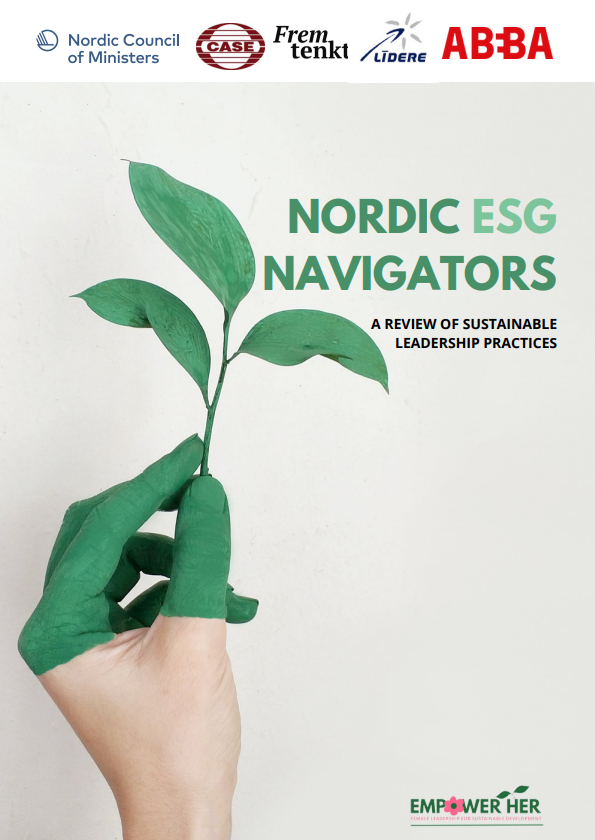 Homepage CASE
Homepage CASE
Selected values

A review of sustainable leadership practices
-

Agnieszka Kulesa
Specialist in Social Sciences
Agnieszka Kulesa has been working at CASE since 2018. She specialises in the labour market, international labour migration, and migration policies within and outside the European Union.
Articles from this author:
-
Exploring the Entrepreneurial Potential of Belarusian Migrants in the EU
This Working Paper aims to deepen the understanding of Belarusian migration to the EU, with a particular focus on entrepreneurship among Belarusian migrants.
-
Intergenerational Dialogue for the Future of My City
The publication is an educator's guidebook designed to inspire and support discussions between youth and elderly participants about shaping the future of urban environments. Created as part of the "Future for All" project by CASE (Center for Social and Economic Research), this guidebook uses Warsaw as a case study but provides adaptable insights for cities globally. It is funded by the European Economic Area and Norwegian Financial Mechanism (2014–2021). The guidebook delves into critical themes, including: Demography: Addressing the implications of an ageing population, declining birth rates, and migration patterns for urban planning and social cohesion. Migration: Exploring the integration of diverse populations and fostering intercultural and intergenerational understanding. Climate Change: Highlighting urban sustainability through public initiatives like green spaces and waste reduction. Digitalisation: Emphasizing smart city development while bridging the generational digital divide. Central to its approach are intergenerational activities that foster collaboration and mutual understanding, with a focus on scenario planning, problem-solving, and community engagement. This resource equips educators with tools to promote critical thinking and inclusivity, encouraging young and older citizens alike to actively shape resilient and sustainable urban communities.
- Poland’s Migration Strategy for 2025-2030 – Expert Commentary
-
Exploring the Entrepreneurial Potential of Belarusian Migrants in the EU
-

Agnieszka Maj
Economist
Agnieszka Maj is an Economist at CASE. She holds an MA degree in International Economic Relations from Cracow University of Economics. Currently, she is obtaining an MA in Gender Studies – Intersectionality and Change at Linköping University. During her education (on both BA and MA levels) she participated in numerous exchange programs at the University … <a href="https://case.dev10.pro/publications/a-review-of-sustainable-leadership-practices/">Continued</a>
Articles from this author:
-
Blueprint and Methodology for Innovative Governance
The publication is a key deliverable within the BioBeo project, funded under the Horizon Europe program. It provides a structured approach to integrating bioeconomy education into school curricula across different institutional and social environments. The report examines the actors involved in curriculum decision-making, from policymakers and school administrators to parents, students, and businesses. It categorizes existing procedures for introducing new content into schools, whether initiated by teachers, school heads, or government authorities. Key barriers—legal, organizational, and socio-cultural—are identified, along with strategies to overcome them. A central theme is the importance of inclusive governance in education, advocating for participatory decision-making that involves various stakeholders. Recommendations highlight the need for flexibility in curriculum design, adequate funding, professional support for teachers, and depoliticization of educational content. The report concludes by situating these findings within the broader BioBeo curriculum framework, reinforcing the role of education in fostering a sustainable and circular bioeconomy.
-
Affordable Sustainable Housing in the EU
The study commissioned by the European Economic and Social Committee, examines strategies to address the pressing challenges of housing affordability and sustainability across the EU. It focuses on two key areas: the role of digitalization in the housing sector and the contribution of social economy initiatives. Key findings include: Digitalization's Role: The study highlights how tools like Building Information Modelling (BIM) and AI can streamline planning, improve energy efficiency, and enhance building management. Case studies from Denmark, France, and the Netherlands illustrate successful digital solutions. Social Economy Contributions: Localized, community-oriented housing solutions, like cooperatives and social rental agencies, demonstrate the value of non-profit initiatives in creating affordable, resilient, and sustainable living environments. Examples include projects in Austria, Poland, and Spain. Policy Recommendations: Medium-term goals (by 2030) include harmonizing EU-wide housing policies and integrating digital platforms. Long-term strategies (by 2050) emphasize developing inclusive housing models and leveraging digital innovations. The study concludes that addressing housing issues requires a holistic approach, combining economic, environmental, and social strategies while fostering cooperation among local, national, and EU stakeholders.
-
Natural disasters: anticipatory governance and disaster risk management from a local and regional perspective
Climate change poses a significant challenge across the European Union, with increasing climate-induced hazards threatening ecosystems, economies, and public well-being. Local and Regional Authorities (LRAs) play a crucial role in addressing these risks due to their close connection to affected communities. Effective Climate Change Adaptation (CCA) strategies must be tailored to local needs, yet many regions face challenges like limited resources and expertise. Proactive crisis management, integrated with Disaster Risk Management (DRM), is essential to prevent future crises. By using strategic foresight tools, LRAs can better prepare for risks, allocate resources effectively, and build community resilience. However, challenges remain, including financial constraints, trust issues and ensuring equity for vulnerable groups. To overcome these obstacles, LRAs should focus on inclusive governance, citizen engagement, and data-driven decision-making. As climate hazards intensify, integrating CCA with DRM at the local level will better equip communities to withstand and recover from climate impacts. Collaborative efforts and capacity-building are key to a resilient future.
-
Blueprint and Methodology for Innovative Governance
-

Marianna Zarychta
Eastern Partnership Specialist
Marianna Zarychta graduated from sociology at the Jagiellonian University in Krakow. She also studies Social Change Management at the Jagiellonian University. Marianna completed her internship at the Marshal’s Office of the Małopolskie Voivodeship in the team for European Union projects. She carried out research for the RMF Group in Krakow, and for the Institute of … <a href="https://case.dev10.pro/publications/a-review-of-sustainable-leadership-practices/">Continued</a>
Articles from this author:
-
Exploring the Entrepreneurial Potential of Belarusian Migrants in the EU
This Working Paper aims to deepen the understanding of Belarusian migration to the EU, with a particular focus on entrepreneurship among Belarusian migrants.
-
In the Shadows. Ukrainian Domestic Workers in Poland
We are pleased to present our report, “In the Shadows: Ukrainian Domestic Workers in Poland,” developed in collaboration with CARE International, an organization dedicated to fighting poverty and social inequality. The research focuses on a frequently overlooked topic – the domestic sector and excluded female emigrants working as domestic workers. We conducted our study in … Continued
-
Exploring the Entrepreneurial Potential of Belarusian Migrants in the EU
Related publications
Thanks for joining us!
You're now part of a community that values [your newsletter's focus]. Get ready to stay informed, inspired, and engaged with our carefully curated content.
